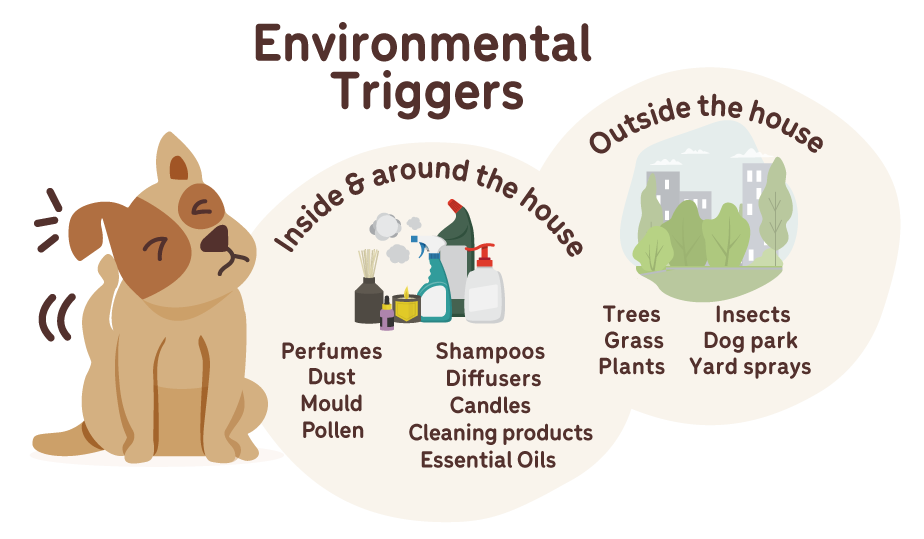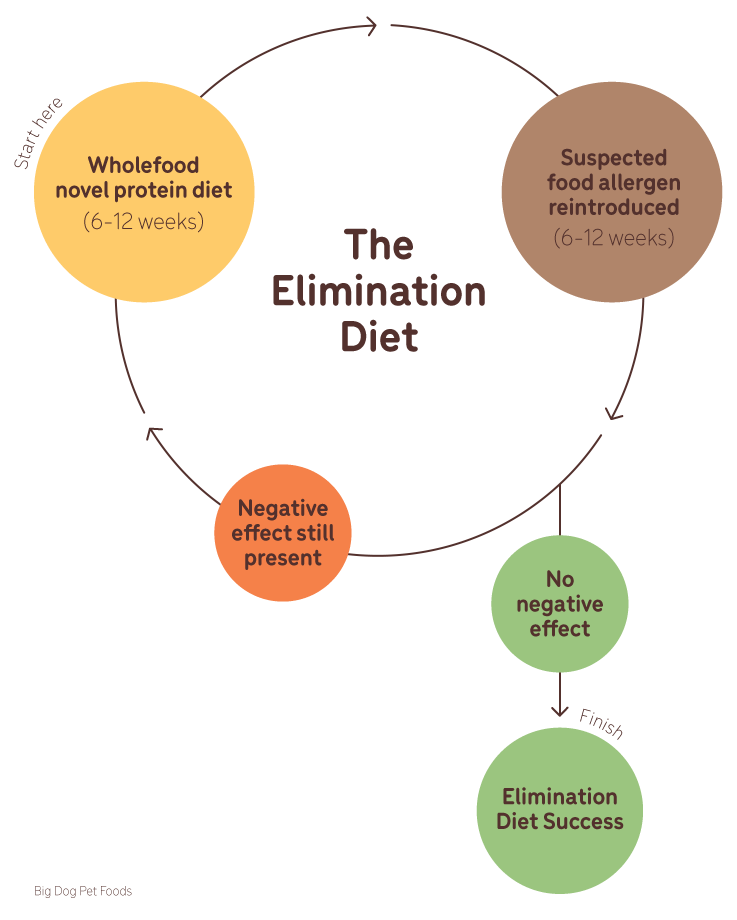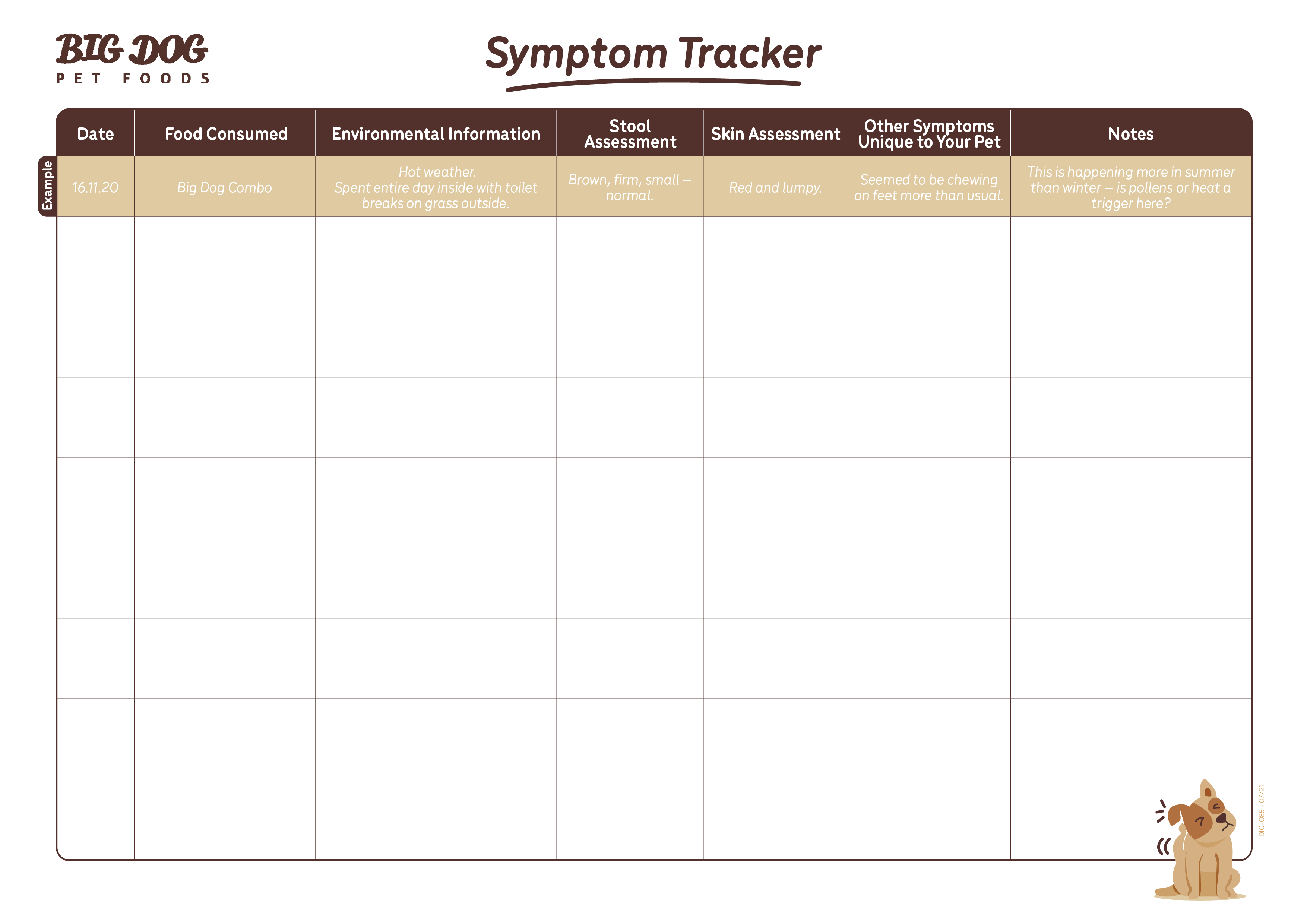Elimination Diets for Dogs – The Big Dog Way

Allergy is a term used to describe a substance that triggers a damaging immune response in the body. Symptoms of allergies in our pets may include itching, scratching, red lumpy skin, or digestive issues to name a few. These symptoms may also be associated with something entirely else and it’s often challenging and stressful for pet parents to figure out what is going on and how to provide relief.

Even the term allergy gets used incorrectly, frequently. To understand more on the difference between a true allergy and an intolerance, head here to read a detailed article on allergies by our friend and Animal Nutritionist, Narelle Cooke.
Thankfully true food allergies are rare despite the host of confusing information out there that may have you thinking differently. In fact, only 1-2% of the pet-popluation have a true food allergy (1).

The vast majority of allergy-driven symptoms are caused by environmental agents (grass, pollens, household cleaning items and irritants like fleas for example) so if you suspect your dog may be allergic to something, it’s always a good idea to rule out environmental triggers first.
If and when environmental allergies have been ruled out and a food is suspected to be involved, then an elimination diet is often employed to help figure out the culprit.
The Traditional Elimination Diet Model
Elimination diets traditionally consist of 1 novel protein and 1 carbohydrate energy source. A novel protein is defined as rare and something not usually included in your pet’s diet. The less they are exposed to a protein, the less likely they will be allergic to it so this is an option they can eat during the elimination phase of the diet.
An elimination phase generally lasts 6-12 weeks and the pet can only consume this bland / limited ingredient diet during this time.
After the elimination phase, the suspected food allergen is then fed to “challenge” the system and see how the pet responds. Pending the outcome of this challenge phase, the elimination phase may need to commence again to continue to narrow down what may be at the root of the problem.
The downside of this approach is that it’s very strict and these novel limited ingredient diets are as limited in nutrition as they are in ingredients. The carbohydrate component is often highly processed (such as starch-heavy ingredients like white rice, potato and tapioca), a source of empty calories which if fed for long periods of time can contribute to health issues such as obesity and diabetes.
With this in mind, this approach may not be the best place to start when it comes to dietary allergen investigations. To us here at Big Dog, starting with this model is pretty extreme and may unnecessarily eliminate a host of nutrient dense foods that are in fact, fine for your dog.

Taking advice from holistic Veterinarian, Dr Duncan Houston, we approach elimination diets with a healthy wholefood novel protein diet and re-assess.
“Where I have a patient with a suspected protein allergy (where more common allergens including environmental allergens have first been excluded) I will trial wholefood limited protein diets initially, for a 6 to 12 week period in adults and a 3 week period in immature animals, rather than using highly processed and synthetic single protein products or a hydrolysed kibble to treat an undiagnosed hunch.
Although, I will note that there is still no general consensus for the dietary trial period. If the body is still responding negatively to this after the food trial, then a stricter approach is warranted (2,3).”
This is the approach we took with Yogi and his journey.
Yogi’s Story

After years of painful skin issues, Yogi’s Mum, Monique chose to feed him Big Dog Wellbeing as she suspected he may have had a beef allergy and this recipe alleviated the skin issues Yogi had battled with for so long.
Following the announcement that due to ongoing supply challenges, our Wellbeing recipe would need to be modified from containing venison, to containing beef. Monique got in touch with our team to share her concerns.
Monique agreed to work with us to put Yogi on a Big Dog wholefoods elimination diet. This started with an 8 week elimination phase using the Big Dog Goat Single Protein Diet. This was a novel protein in Yogi’s diet but didn’t lack the wholefood nutrition that comes from our naturally complete and balanced recipes.
After 8 weeks, we trialled Yogi on our beef-containing Wellbeing recipe to great success and he has continued to enjoy this recipe ever since.
“He did fantastic! There were no issues whatsoever. There was no itching, no scratching, no bleeding, no flaky skin, and just all round he seemed a lot happier” - Monique, Yogi’s mum.
Asking Dr. Duncan his take on the research on this topic he advises; “It’s important to acknowledge that one of the biggest culprits in food-based allergens for pets actually isn’t the whole food itself, it’s the processed version of it. Highly-processed foods can change how a protein, or allergen, is presented to the body (whether good or bad) and many of these (e.g. dry food / kibble and certain treats) have discrepancies between their ingredients and their labels. (4,5,6)”
The quality of food your pet is consuming has an impact on their ability to tolerate that food and more information is shared on this topic by Narelle Cooke, animal nutritionist here.
What if a wholefoods single meat protein diet doesn’t seem to help?
There is most certainly a place for strict elimination diets, in the 1-2% of the pet population who suffer from true food allergies. Asking Dr. Duncan what next, his approach is as follows:
“If the body is still responding negatively to this after the food trial, then a stricter approach is warranted. Depending on the age of the animal I will tailor [the diet] to what suits the client [pet parent] in terms of their commitment. If the client is unable to do this in a natural manner, then that is when I will offer hydrolysed / processed products for a trial. I will also do this for difficult cases as one; an owner needs to be committed, so ease of use of a product can be vital, and two; if we are struggling to work out a proper natural treatment with severe / difficult cases then I will prescribe medication and go towards processed options that have trusted research backing them.
Ultimately, there isn’t a single diet that works for every animal, but with the current range of natural limited protein products on the shelves there are several that you as a pet parent can start with.”
So, you think your dog may have an allergy?
If you’ve ruled out environmental allergies for your pet and suspect there may be a food allergy, you can download this handy symptoms tracker to track their diet and symptoms.
If you need help with the stool assessment, we have a handy guide available here.

For the best results, we always recommend to work with a natural health professional such as your local integrative veterinarian or a qualified canine nutritionist.
You can always get in touch with our team anytime to help guide you and help with any information we can.
Note: This blog is not meant to replace veterinary advice. Please chat to your vet if you're concerned about your pet's health.
References
1. Day, M. J. (2005, 2005) The canine model of dietary hypersensitivity. Proceedings of the Nutrition Society 64, 458-464
2. Olivry, T. and Mueller, R., 2020. Critically appraised topic on adverse food reactions of companion animals (9): time to flare of cutaneous signs after a dietary challenge in dogs and cats with food allergies. BMC Veterinary Research, 16(1).
3. Olivry, T., Mueller, R. and Prélaud, P., 2015. Critically appraised topic on adverse food reactions of companion animals (1): duration of elimination diets. BMC Veterinary Research, 11(1).
4. Alvarez, P. and Boye, J., 2012. Food Production and Processing Considerations of Allergenic Food Ingredients: A Review. Journal of Allergy, 2012, pp.1-14.
5. Gaschen, F. and Merchant, S., 2011. Adverse Food Reactions in Dogs and Cats. Veterinary Clinics of North America: Small Animal Practice, 41(2), pp.361-379.
6. Olivry, T. and Mueller, R., 2018. Critically appraised topic on adverse food reactions of companion animals (5): discrepancies between ingredients and labeling in commercial pet foods. BMC Veterinary Research, 14(1).
